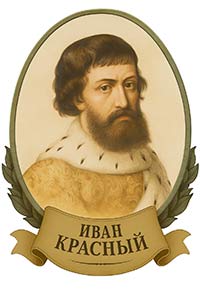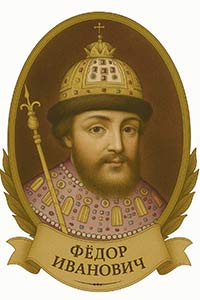История России. Рюрики. 32 ИВАН КРАСНЫЙ
На этой странице вы ознакомитесь с основными фактами о ИВАНЕ КРАСНОМ. Текст озвучен. Даны ключевые слова для запоминания. После изучения текста вы можете проверить себя, чтобы убедиться в понимании материала.

| № | Английский | Русский |
|---|---|---|
| 1 | Ivan II Ivanovich, nicknamed “Red”, was born in 1326 and lived for 33 years (1353–1359, 6 years) — Grand Duke of Zvenigorod, Moscow, Vladimir, and Novgorod, the youngest son of Ivan Kalita. | Иван II Иванович по прозвищу «Красный» родился в 1326 году и прожил 33 года (1353–1359, 6 лет) — великий князь Звенигородский, Московский, Владимирский и Новгородский, младший сын Ивана Калиты. |
| 2 | He received the nickname “Red” because of his appearance and character. | Он получил прозвище «Красный» за свою внешность и характер. |
| 3 | In Old Russian, “red” meant “beautiful”. | На древнерусском языке слово «красный» означало «красивый». |
| 4 | The prince’s nature matched his gentle looks. | Нрав князя соответствовал его мягкой внешности. |
| 5 | He was meek, quiet, and devout. | Он был кротким, тихим и набожным человеком. |
| 6 | After his brother Simeon the Proud and his sons died of plague, Ivan inherited Mozhaisk and Kolomna. | После смерти брата Симеона Гордого и его сыновей от чумы Иван унаследовал Можайск и Коломну. |
| 7 | During his reign, the production of coins began, which depicted a warrior on horseback slaying a snake with a spear. | При нём начался выпуск монет, на которых изображался воин на коне, поражающий змея копьём. |
| 8 | He ruled in a time of weakening of the Moscow principality. | Он правил в период ослабления Московского княжества. |
| 9 | At that time, the Grand Duchy of Lithuania seized Bryansk and secured the appointment of a separate metropolitan in Kyiv. | Тогда Великое княжество Литовское отняло Брянск и добилось назначения отдельного митрополита в Киеве. |
| 10 | Ivan II sent his army, and “the Mozhaisk and Volotsk troops liberated Rzhev and drove the Lithuanians away.” | Иван II направил войско, и «Можайская и Волотьская рать освободили Ржев и прогнали литовцев». |
| 11 | Khan Berdibek of the Golden Horde decided to delimit lands anew and sent his envoys to Moscow. | Хан Бердибек из Золотой Орды решил перераспределить земли и отправил своих послов в Москву. |
| 12 | But Ivan II refused them entry, saying he already knew what lands belonged to whom. | Но Иван II не пустил их в город, заявив, что и так знает, какие земли кому принадлежат. |
| 13 | This became the first known case of disobedience to the Horde in Russian history. | Это стало первым случаем неповиновения Орде в истории Руси. |
| 14 | Over time, Ivan II greatly worsened Moscow’s position in the region. | Со временем Иван II значительно ухудшил позиции Москвы в регионе. |
| 15 | He died in Moscow in 1359 for an unknown reason. | Он скончался в Москве в 1359 году по неизвестной причине. |
ПРОСЛУШАЙТЕ ТЕКСТ
КЛЮЧЕВЫЕ СЛОВА:
ПРОВЕРЬ СЕБЯ:
1. When was Ivan Red born?
2. Why was he called “Red”?
3. What did “red” mean in Old Russian?
4. What was his character like?
5. Whose lands did he inherit?
6. What did his coins show?
7. What weakened during his reign?
8. What city did Lithuanians seize?
9. What did his army liberate?
10. Who sent envoys to Moscow?
11. What was Ivan II’s response?
12. What was this act called?
13. What did Ivan II worsen?
14. When did he die?
ПРОСЛУШАЙТЕ ТЕКСТ
История России. Рюрики. 40 ФЁДОР ИВАНОВИЧ
На этой странице вы ознакомитесь с основными фактами о ФЁДОРЕ ИВАНОВИЧЕ . Текст озвучен. Даны ключевые слова для запоминания. После изучения текста вы можете проверить себя, чтобы убедиться в понимании материала.

| № | Английский | Русский |
|---|---|---|
| 1 | Fyodor Ivanovich was born in 1757, lived 41 years (1584 - 1598 14 years) - Tsar of All Rus', son of Ivan the Terrible and Anastasia Romanova. | Фёдор Иванович родился в 1757 г. прожил 41 год (1584 – 1598 14 лет) - царь всея Руси, сын Ивана Грозного и Анастасии Романовой. |
| 2 | There is still no consensus among experts about Fedor’s role in Russian history. | О роли Федора в истории среди экспертов до сих пор нет единого мнения. |
| 3 | Some consider him a mentally unhealthy monarch... others consider him a kind and deeply spiritual person, under whom Russia experienced a political and cultural upsurge. | Одни считают его нездоровым... другие — добрым и глубоко духовным, при котором Россия пережила политический и культурный подъём. |
| 4 | Fyodor Ivanovich was the complete opposite of his father — a meek, kind and pious ruler. | Фёдор был полной противоположностью отца — кроткий, добрый и благочестивый. |
| 5 | Under him, the war with Sweden ended. | При нём завершилась война со Швецией. |
| 6 | The Moscow Patriarchate was established. | Был учреждён Московский патриархат. |
| 7 | Voronezh, Saratov, Tyumen and others were annexed. | Были присоединены Воронеж, Саратов, Тюмень и др. |
| 8 | The patriarchate was established — a system of church government with a patriarch at its head. | Было создано патриаршество — церковная система с патриархом во главе. |
| 9 | The king almost did not participate in government. | Царь почти не участвовал в управлении. |
| 10 | His brother-in-law Boris Godunov was in charge of all matters. | Всем занимался его шурин Борис Годунов. |
| 11 | Fedor tried to rule peacefully and fairly. | Фёдор старался править мирно и справедливо. |
| 12 | The Tsar Cannon was cast under him. | При нём была отлита Царь-пушка. |
| 13 | It weighed more than 39 tons. | Она весила больше 39 тонн. |
| 14 | Died without leaving any offspring, ending the Rurik dynasty. | Умер, не оставив потомства, династия Рюриковичей прекратилась. |
| 15 | The death of Fyodor Ioannovich occurred in 1598 in Moscow from natural causes. | Смерть Фёдора наступила в 1598 году в Москве по естественным причинам. |
| 16 | He was often sick and in poor health. | Он часто болел и был слаб здоровьем. |
ПРОСЛУШАЙТЕ ТЕКСТ
КЛЮЧЕВЫЕ СЛОВА:
ПРОВЕРЬ СЕБЯ:
1. When and where was Fyodor born?
2. What do experts still argue about?
3. What do some consider him and what do others think?
4. How was Fyodor different from his father?
5. What war ended during his reign?
6. What major religious institution was founded?
7. What cities were annexed?
8. What is a patriarchate?
9. Did Fyodor actively participate in government?
10. Who handled state affairs?
11. How did Fyodor try to rule?
12. What famous weapon was cast during his rule?
13. How much did the Tsar Cannon weigh?
14. What happened to the Rurik dynasty after his death?
15. When and how did he die?
16. What was his health like?
ПРОСЛУШАЙТЕ ТЕКСТ





 Как правильно изучать английский язык по карточкам (статьи)
Как правильно изучать английский язык по карточкам (статьи)